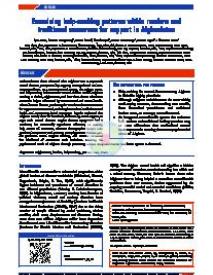Examining help-seeking patterns within modern and traditional resources for support in Afghanistan
Little is known about who and what Afghans turn to cope with mental distress precipitated by ongoing socio-political and economic problems. In a cross-sectional survey, the authors examined help-seeking behaviour for mental distress in 306 Afghans residing in Kabul, Afghanistan, and how their choice of what to access for help is influenced by various social and mental healthrelated factors. Factors predicting the use of six distinct resources for support were examined, including biomedical and behavioural health and community-based resources.
Results indicated that Afghans mostly draw on their faith, followed by social support, to cope with mental distress. Higher distress symptoms had a moderate, but statistically significant influence, on seeking help across all resources, whereas demographic factors only predicted encounters with primary care physicians. Female gender predicted social support seeking, and income increased the likelihood of encounters with herbalists. Meeting the psychosocial needs of Afghans through promoting a more integrated mental healthcare system is discussed.
KEY IMPLICATIONS FOR PRACTICE
Help-seeking for mental distress among Afghans in Kabul is highly pluralistic
Although religious activities were the most widely used coping resource, those seeking care outside, from biomedical practitioners and traditional healers were, on average, more distressed.
An integrated mental health system that embraces both modern and traditional healing practices may be more efficacious than medicalised mental health systems in meeting the unmet psychosocial needs of Afghans.
In: Intervention: Journal of Mental Health and Psychosocial Support in Conflict Affected Areas, ISSN 1571-8883 | 16 | September-December | 3 | 215-221
http://doi.org/10.4103/INTV.INTV_33_18
http://www.interventionjournal.org/article.asp?issn=1571-8883;year=2018;volume=16;issue=3;spage=215;epage=221;aulast=Alemi;type=0


